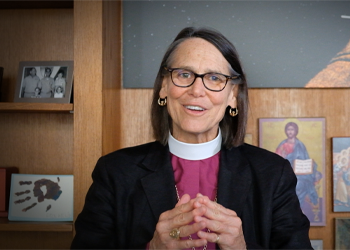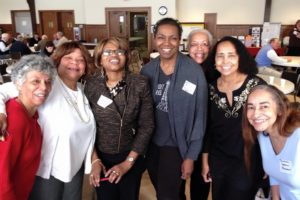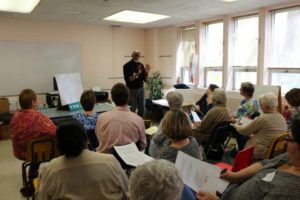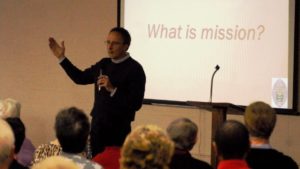More than one-third of our churches are working intentionally on congregational development and revitalization. While there is largely a mission focus in this work, these congregations are paying attention to three key focus areas for growth:
- Loving Community (belonging): a community who cares for us
- Mission (purpose): a community who serves others
- Discipleship (Christian formation and stewardship): a community who helps us take the next steps along our spiritual paths
Many of our congregations are directly engaging questions about how to reach and serve the people around us and asking: Who is our mission field? Who are our missionaries? How will we build loving relationships with one another? These and other congregations (using basically the same model) are discerning new people to reach out to in community by studying demographic reports and being present in their neighborhoods – sometimes through walking the neighborhood (e.g., neighborhood prayer walks), community outreach (e.g., companionship, neighborhood cleanup, food, clothing, shelter, education, jobs), conversations and partnerships with local agencies (e.g., city, chamber of commerce, economic development, police, nonprofits, community associations), and applying community organizing models (e.g., one-to-one relational meetings).




 A focus on loving community has been essential. When churches are struggling with issues of a changing world and shortages of money and people, we are seeing more congregational leaders or groups who are in conflict, and this conflict has been worsened by increasing polarization of issues and incivility in the secular world. During the past year, more churches have discovered new vitality from mediation work with diocesan staff or consultants and from adopting and implementing new cultural focus areas and behavioral covenants as part of their community values and norms. In addition, we have led a three-year diocesan focus on reconciliation, including the Visions Inc. diversity and inclusion workshops in February and March 2017 for leadership teams of all congregations. The Visions workshops shared excellent guidelines for equity and inclusion that can help all of us to listen, have better conversations around difficult issues, and help us begin to practice, learn and model a Christian process for loving confrontation and reconciliation.
A focus on loving community has been essential. When churches are struggling with issues of a changing world and shortages of money and people, we are seeing more congregational leaders or groups who are in conflict, and this conflict has been worsened by increasing polarization of issues and incivility in the secular world. During the past year, more churches have discovered new vitality from mediation work with diocesan staff or consultants and from adopting and implementing new cultural focus areas and behavioral covenants as part of their community values and norms. In addition, we have led a three-year diocesan focus on reconciliation, including the Visions Inc. diversity and inclusion workshops in February and March 2017 for leadership teams of all congregations. The Visions workshops shared excellent guidelines for equity and inclusion that can help all of us to listen, have better conversations around difficult issues, and help us begin to practice, learn and model a Christian process for loving confrontation and reconciliation. Annual Requiem or Renaissance workshops have invited church leadership teams into conversations around congregational renewal and were often the starting place for revitalization. Over 200 leaders from nearly three-dozen congregations have participated in these workshops. Last December, the Vital Congregations Team of Diocesan Council and Diocesan staff also initiated an Advanced Renaissance workshop and we plan to continue these regularly to work on particular needs of redeveloping congregations and to strengthen development plans. Church leaders get a big boost from sharing and hearing what others are doing with similar opportunities and challenges. Their priests are invited to participate in our Priest-Developer Group, a group of priests from congregations that are intentionally working on development which meets monthly to learn from and support one another.
Annual Requiem or Renaissance workshops have invited church leadership teams into conversations around congregational renewal and were often the starting place for revitalization. Over 200 leaders from nearly three-dozen congregations have participated in these workshops. Last December, the Vital Congregations Team of Diocesan Council and Diocesan staff also initiated an Advanced Renaissance workshop and we plan to continue these regularly to work on particular needs of redeveloping congregations and to strengthen development plans. Church leaders get a big boost from sharing and hearing what others are doing with similar opportunities and challenges. Their priests are invited to participate in our Priest-Developer Group, a group of priests from congregations that are intentionally working on development which meets monthly to learn from and support one another. All of this work requires leadership development. As part of clergy development, we have our Academy for Vocational Leadership (with Eastern and Western Michigan) and our three-year training program for ten curates. Lay leaders in dozens of congregations participated in workshops about Vestry and ministry team processes and roles (including mutual ministry reviews, holy conversations and asset-mapping), leading change, stewardship, and helping others grow into ministries. Leaders from 32 congregations also participated in two Diocesan Vestry retreat days in February. In terms of discipleship training, we are in conversations with Virginia Theological Seminary to become one of their pilot dioceses for Living Baptized Ministry. There is a lot more to do in terms of Christian formation!
All of this work requires leadership development. As part of clergy development, we have our Academy for Vocational Leadership (with Eastern and Western Michigan) and our three-year training program for ten curates. Lay leaders in dozens of congregations participated in workshops about Vestry and ministry team processes and roles (including mutual ministry reviews, holy conversations and asset-mapping), leading change, stewardship, and helping others grow into ministries. Leaders from 32 congregations also participated in two Diocesan Vestry retreat days in February. In terms of discipleship training, we are in conversations with Virginia Theological Seminary to become one of their pilot dioceses for Living Baptized Ministry. There is a lot more to do in terms of Christian formation!